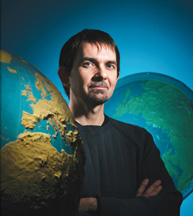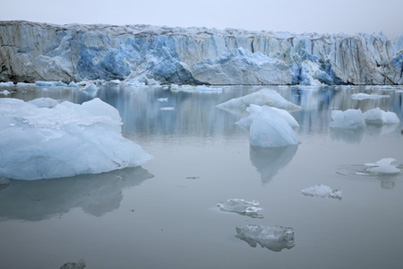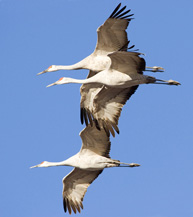AROUND CAMPUS
Pondering cultural studies in Canada

Is there a distinctive cultural studies tradition in Canada? In what ways does Canada's location between empires (geographically, culturally, politically) produce unique ideas and concepts in the study of contemporary culture? These are but a few of the burning cultural questions Professor Imre Szemán had to ponder while putting together a major new collection of essays on Canadian cultural studies.
On Thursday, April 3, Professor Szemán, the Senator William McMaster Chair of Globalization and Cultural Studies at McMaster University, will share his insights in a talk titled Between Empires: Cultural Studies in Canada, during the McGill Institute of Canadian Studies' annual J.R. Mallory Lecture in Canadian Studies. Professor Szemán is the author of Zones of Instability: Literature, Postcolonialism and the Nation (2003) and co-author of Popular Culture: A User's Guide (2004).
The endowment for the J.R. Mallory Lecture in Canadian Studies was established in January 1995. Over the years, it has featured such renowned speakers as Roch Carrier, John Meisel, Bob Rae, Warren Allmand, Sylvia Ostry, Peter G. White, Phyllis Lambert and John Gomery.
Thursday, April 3, 2008, 4 p.m.; Faculty Club, 3450 McTavish St. RSVPs by email or by calling 514-398-8346. A cocktail will follow the lecture.
Melting glaciers...what gives?

Istockphoto
With melting glaciers in the news again, McGill Professor Bruno Tremblay of Atmospheric and Oceanic Sciences brings a discussion on the truth and fiction of melting arctic glacial ice to the next installment of Freaky Fridays, April 4 at the Redpath Museum. Professor Tremblay's research focuses on high-latitude climate change, with special emphasis on the future of the sea-ice cover in a warming world. He spent part of October 2007 taking measurements of the ice in the Canadian Arctic. A viewing of The Day After Tomorrow, a 2004 apocalyptic science-fiction film that depicts the catastrophic effects of global warming, follows Professor Tremblay's presentation.
Melting glaciers...what gives? Friday, April 4, 5 p.m.; Redpath Museum Auditorium, 859 Sherbrooke St. West. Seating is limited, but reservations are not necessary. For more information, contact Ingrid Birker at 514-398-4086 ext. 4094 or by email.
The whole enchilada

Istockphoto
The 5th annual Interdisciplinary Graduate Student Symposium, titled The Whole is Greater than the Sum of the Parts, aims to open the lines of communication – and expose more than a few mutually beneficial links – between graduate students working in diverse fields of research. "People often believe that scientists always work with someone in the same field and have a lack of communication with the public audience," said co-organizer Elvis Pandzic, a PhD student in Physics. "The symposium creates a platform for students to interact with others and exchange ideas with contemporary researchers from different scientific disciplines."
Of the 83 presentations scheduled during the symposium, April 3 and 4 at Thomson House, 22 will represent McGill's graduate expertise in Agriculture and Environmental Sciences, Engineering, Medicine and Science. Others represent the work of visiting researchers from Concordia University, University of Ottawa, Queen's University, and University of Alaska Fairbanks. The keynote address by Dr. Michel Loreau, Canada Research Chair in Theoretical Ecology, 'Losing the parts might mean losing the whole, or why we should care about biodiversity,' is based on his work focusing on the relationship between biodiversity and ecosystem functioning.
The 5th annual Interdisciplinary Graduate Student Symposium, April 3-4, Thomson House, www.mcgill.ca/science/igsrs; free; open to the public.
Earth Day at the Museum

Istockphoto
In anticipation of Earth Day, discover how eggs, nests and birds work together and hold the key to life in an interactive family discovery workshop for all ages at the Redpath Museum. An English session takes place from 1:30 to 2:30 p.m., followed by a French session from 3:00 to 4:00 p.m.
Learn more about birds and migration at a viewing of Jacques Perrin's visually dazzling 2003 documentary, Winged Migration, which uses state-of-the-art technologies to capture birds in migration. The film was nominated for an Academy Award in the Best Documentary category.
Screening starts at 4 p.m. Earth Day at the Museum: Eggs, nests and Birds; Sunday, April 20; Redpath Museum Auditorium, 859 Sherbrooke St. West; $6 per child; parents free. For more information, contact Ingrid Birker at 514-398-4086 ext. 4094 or by email.
Top role model

CariDee English, the winner of Cycle 7 of the U.S. television series America's Top Model, will be at McGill's Palmer Lecture Hall on Friday, April 4, sharing the inspirational story of her lifelong struggle with psoriasis, a skin and joint disease affecting nearly one million Canadians. Loud and Clear with CariDee, Taking Control of Psoriasis, is a free psoriasis public education forum stopping in five Canadian cities. The tour is sponsored by the Psoriasis Education Program of Canada. At McGill, Ms. English will appear with Dr. Raynald Molinari from the MUHC's Division of Dermatology, who will discuss new treatment options for those suffering from the disease.
Friday, April 4, 7 p.m.; Palmer Lecture Hall, 6th Floor, McIntyre Medical Building; 3655 Promenade Sir William Osler. Free; open to the public, but seating is limited. Register through the Psoriasis Education Program's website at psoriasisinfo.ca/forum.

